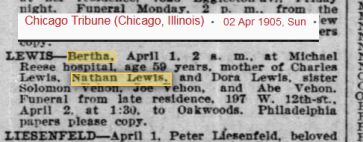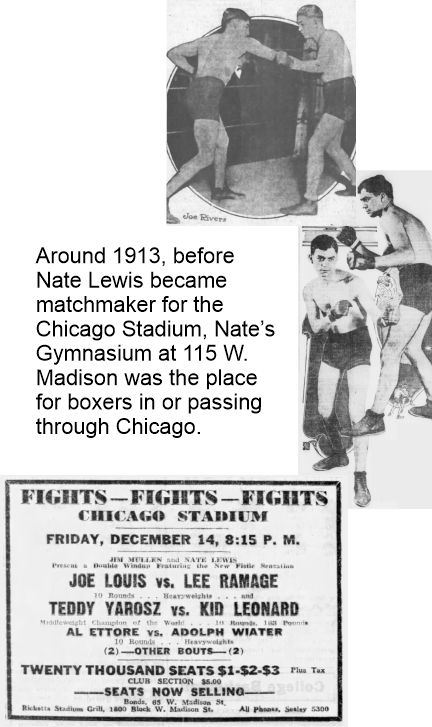|
Nineteen-year-old Rose Ginsberg (1884–1975) was one of only a
dozen individuals known to have gone alone to the matinee at the Iroquois
Theater on December 30, 1903, and only the third woman I've found so far.
When she saw a fire in a stage curtain, Rose quickly recognized
the capacity for extreme danger. She offered to
help a nearby mother and her two young
children evacuate but the mother declined, confidant
the fire would be put out.
Rose left her seat in the third-floor balcony and approached
an exit that was attended by an unidentified usher. She asked
him to open the curtains covering the exit so she could leave the
auditorium. He refused, Rose reported later, and threatened to
have her arrested if she "made a fuss." When she
ignored him and opened the door anyway, he remarked
that the fire troubled him as well — and followed
her out.
|
|
|
Rose Ginsburg was one of the first audience survivors to
speak publicly about Iroquois ushers behaving in a manner
that reflected poor management. It would
become clear later in trial testimony that the only
training received by Iroquois ushers was at a prior
performance when theater manager,
Will J. Davis, reprimanded one in their number
for opening an auditorium fire escape exit to let in
a breeze. Translation: opening a door may tick
off the boss and cost your job. No surprise
then that their responses to the fire were
scattershot. A few were concerned for the
safety of others in the theater, one losing his life
in the process; more were worried about preserving
their job and/or personal life and limb, some even
going so far as to run home when the fire broke out.
A resident of Aurora, Illinois, west of Chicago, Rose had come to the city
to pay an unannounced call on her aunt Bertha Vehon
Lewis (1846–1905) who lived at 197 W. 12th Street.*
On route, Rose decided to
take in the Mr. Bluebeard matinee before
surprising her aunt. The performance had
already started and only standing room space in the
gallery was available.
Rose's family
Rose was the daughter of European immigrants, Nathan B. Ginsberg
(1860–1937) and Yetta/Jessie
Arnsdorff Ginsberg (1858–1936). Her father and
his brother, Isaac Ginsberg, co-owned a dry goods
store in Auorora, Il, a community of around
twenty-five thousand people forty miles west of
Chicago. Years later the brothers would separate and
each operate their own store in Aurora, Nathan's
specializing in clothing. Rose was one of five
born to Nathan and Yetta, and the oldest of their
four daughters. One of the girls passed in 1906.
Rose and the surviving two girls lived in the family
home throughout their lives and worked in their
father's store.
|

|
Ginsberg Vehon Arnsdorff Lewis connection
I failed to find verification of the familial connection between Rose
Ginsberg (or her mother Yetta/Jessie Arnsdoff), and her aunt Bertha Vehon Lewis so
hope someday a genealogy researcher with the answer will come across this
story. The only period clue tying the Rose Ginsburg of this Iroquois
incident to Bertha Lewis is Bertha's address on West Twelfth St.
Using that address led to her obituary and U.S. Census reports. Here's
what I've turned up so far:
Bertha emigrated to America from Russia in 1883 with her son Nate and late husband,
Moses Lewis (1849–1896). Moses
worked as a peddler in Chicago. He died from injuries suffered
when he was run
over by a horse and buggy while crossing the street.
(The horse stepped on and broke Mose's leg and the
buggy wheels passed over his body, causing internal
injuries. The driver at fault drove away, ignoring
commands to stop by police officer Denney.)
Bertha and Moses had three children — Charles, Dora
and Nathaniel.† I do not know the names of
Mose Lewis's parents or siblings.
Bertha was the only daughter
and youngest child of Solomon and Hannah Burnhaven Vehon.
Some Vehon genealogy compilations do not include Bertha but the
names of her three brothers as cited in her 1905 newspaper death
notice — Solomon, Joe and Abe — connect her to Solomon
and Hannah Vehon. The name Nathan wasn't rare but
it was uncommon enough that I suspect a clue might be found in Rose Ginsburg's father's name
being Nathan and Bertha Lewis naming her first-born son Nathan.

|
|
Discrepancies and addendum
* There was also in Chicago a 197 West Twelfth Place,
at which the Jewish Manual Training School was built in 1897.
† The notable boxing management/promotional
career of Nathaniel "Nate" Lewis (1881–1952) had begun
and days after the Iroquois Theater fire was mentioned in a news
story about Jim Callahan having cancelled a fight with Clarence
Forbes at the Watita Club. Of his forty+ years of
adventures in fighting, Lewis cited as one of his proudest accomplishments
having played a small role in helping Joe Louis get his career
off the ground in 1934. Nate claimed credit only for having
put money on an obvious sure-thing fighter.
|

|
